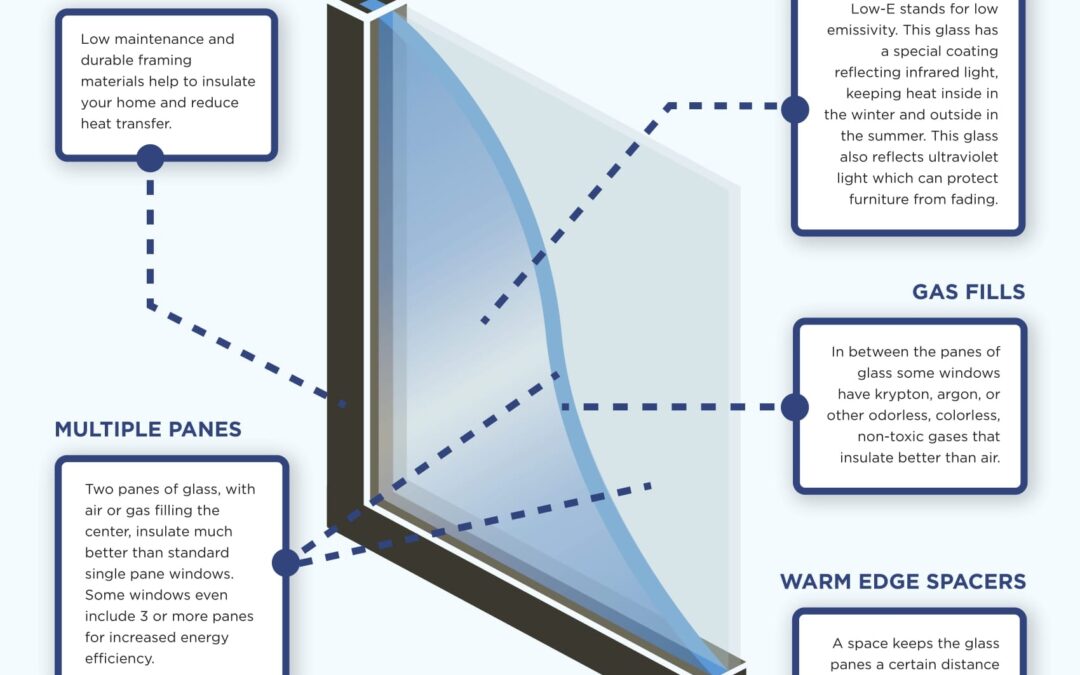Windows play a significant role in the overall energy efficiency of a home. They can either be a source of heat loss or an essential element in maintaining a comfortable indoor temperature. Energy-efficient window installation not only helps you save money on your energy bills but also contributes to a more sustainable living environment. In this blog post, we’ll delve into the benefits of energy-efficient windows, various types of energy-efficient window installations, and tips for choosing the right windows for your home.
The Benefits of Energy-Efficient Windows
Installing energy-efficient windows comes with numerous advantages, including:
Lower Energy Bills
Energy-efficient windows reduce heat transfer, helping to maintain a consistent indoor temperature. This means your heating and cooling systems won’t have to work as hard, resulting in lower energy bills and reduced energy consumption.
Enhanced Comfort
By minimizing drafts and cold spots, energy-efficient windows help create a more comfortable living environment. This can be particularly beneficial during extreme weather conditions, ensuring that your home remains cozy and inviting all year round.
Reduced Environmental Impact
By consuming less energy, you’re not only saving money but also contributing to a greener, more sustainable future. Energy-efficient window installations can help reduce your home’s carbon footprint and lessen its impact on the environment.
Increased Home Value
Energy-efficient windows are an attractive feature for potential homebuyers, as they signify long-term savings and improved comfort. By investing in energy-efficient window installations, you can potentially increase the resale value of your property.
Types of Energy-Efficient Window Installations
There are several types of energy-efficient window installations to choose from, each offering unique benefits and features. Some popular options include:
Double-Pane Windows
Double-pane windows consist of two layers of glass separated by a layer of gas, usually argon or krypton. This design helps to reduce heat transfer, making them significantly more energy-efficient than single-pane windows. Double-pane windows also provide better soundproofing and insulation than their single-pane counterparts.
Triple-Pane Windows
Triple-pane windows feature three layers of glass with gas-filled spaces between each layer. While more expensive than double-pane windows, triple-pane windows offer even greater energy efficiency, insulation, and noise reduction. They are particularly well-suited for homes in extreme climates or those located near busy roads or airports.
Low-Emissivity (Low-E) Glass
Low-emissivity (Low-E) glass is coated with a thin metallic layer that reflects heat while allowing natural light to pass through. This coating helps to minimize heat transfer, keeping your home cooler in the summer and warmer in the winter. Low-E glass can be incorporated into both double-pane and triple-pane window installations for enhanced energy efficiency.
Choosing the Right Energy-Efficient Windows for Your Home
When selecting energy-efficient windows for your home, consider the following factors:
Climate and Weather Conditions
Your local climate and weather conditions play a significant role in determining the most suitable type of energy-efficient window installation for your home. For example, in colder climates, you may benefit more from triple-pane windows, while double-pane windows with Low-E glass might be sufficient in milder regions.
Window Orientation
The orientation of your windows can also impact their energy efficiency. South-facing windows receive more sunlight, so consider installing windows with a higher Solar Heat Gain Coefficient (SHGC) to maximize passive solar heating. On the other hand, north-facing windows require better insulation to minimize heat loss, so opt for windows with a lower U-value.
Energy Performance Ratings
When choosing energy-efficient windows, look for products with good energy performance ratings. These ratings, such as the U-value (which measures heat transfer) and the SHGC (which measures solar heat gain), can help you compare different window models and make an informed decision.
Professional Installation
Proper installation is crucial to ensuring the full benefits of energy-efficient windows. Work with a reputable and experienced window installer who can guarantee airtight and well-insulated window installations.
Energy-efficient window installation offers numerous benefits, including lower energy bills, enhanced comfort, reduced environmental impact, and increased home value. By choosing the right type of energy-efficient windows for your home and working with a skilled professional for proper installation, you can enjoy long-term savings and contribute to a more sustainable living environment. Invest in energy-efficient windows today to experience the advantages of improved insulation, noise reduction, and enhanced overall comfort in your home.

